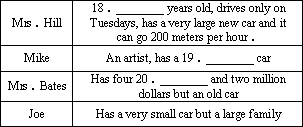题目内容
做题时,先将答案划在试卷上。录音内容结束后,你将有两分钟的时间将试卷上的答案转涂到答题卡上。
第一节 (共5小题;每小题1分,满分5分)
听下面5段对话。每段对话后有一个小题,从题中所给的A、B、C三个选项中选出最佳选项,并标在试卷的相应位置。听完每段对话后,你都有10秒钟的时间来回答有关小题和阅读下一小题。每段对话仅读一遍。
1.Who is sick?
A.Both John and Jack. B.John. C.Jack.
2.What does the man think about those students?
A.He approves of them.
B.He thinks that they deserve the punishment.
C.He feels sorry for them.
3.What can we know from the conversation?
A.The man didn’t phone the woman.
B.The woman forgot to take the book.
C.The woman has taken the book with her.
4.What day is it tomorrow?
A.Thursday. B.Tuesday. C.Monday.
5.What does the man think about driving these days?
A.It is expensive. B.It is difficult. C.It is frightening.
第二节 (共15小题;每题1分,满分15分)
听下面5段对话或独白。每段对话或独白后有几个小题,从题中所给的A,B,C三个选项中选出最佳选项,并标在试卷的相应位置。听每段对话或独白前,你将有时间阅读各个小题,每小题5秒钟;听完后,每小题将给出5秒钟的作答时间。每段对话或独白读两遍。
听第6段材料,回答第6至8题。
6.What were Ben and Mike quarrelling about?
A.About a fighting. B.About Ben’s MP3. C.About Mike’s MP3.
7.What is Mike going to do?
A.He’s going to buy a new MP3.
B.He’s going to fix the broken MP3.
C.He’s going to talk about the MP3 with Ben’s parents.
8.Who may the woman most probably be?
A.Ben’s mother. B.Mike’s mother. C.Ben and Mike’s teacher.
听第7段材料,回答第9至10题。
9.What’s the purpose of the man’s visit?
A.To submit his job application.
B.To be interviewed for a job.
C.To design some children’s clothes.
10.What can we infer from the conversation?
A.The woman seems to be satisfied with the man.
B.The woman will have a further discussion with the man.
C.The woman is a designer in the company.
听第8段材料,回答第11至13小题。
11.Where may the two speakers most probably be?
A.In the office. B.In a clothing factory. C.At home.
12.Who gave the man this piece of cloth?
A.The man’s mother. B.The woman’s mother. C.Their friend’s mother.
13.What is the man going to do tomorrow?
A.To give a lecture. B.To attend a meeting. C.To go to the clothing factory.
听第9段材料,回答第14至17题。
14.What does the man want to do?
A.To return the book Art Theory.
B.To apply for a new library card.
C.To borrow some books.
15.Where does the man live?
A.In the school dorm.
B.At 1423 West Canal Street.
C.At this friend’s house.
16.Checking on her computer, what does the woman discover?
A.The man has changed his name.
B.The man recently moved to a new place.
C.There are two students with the same name.
17.What can we know from the conversation?
A.Books cannot be checked out of the school library.
B.This is the first time that the man has come to this library.
C.The man is doing some research on art.
听第10段材料,回答第18至20题。
18.In which year was the Nobel Prize first a warded?
A.In 1939. B.In 1919. C.In 1901.
19.When did Lessing know that she won the prize?
A.As soon as the news was announced.
B.A few hours after the news was announced.
C.The next day after the new was announced.
20.What are many of her books about?
A.Women’s rights and politics.
B.Science.
C.Her life in Africa.
1.C
2.B
3.C
4.A
5.A
6.B
7.A
8.C
9.B
10.A
11.C
12.B
13.A
14.C
15.A
16.C
17.B
18.C
19.B
20.A

 天天向上一本好卷系列答案
天天向上一本好卷系列答案 小学生10分钟应用题系列答案
小学生10分钟应用题系列答案
做题时,先将答案划在试卷上。录音内容结束后,你将有两分钟的时间将试卷上的答案转涂到答题卡上。
第一节(共5小题;每小题1.5分,满分7.5分)
听下面5段对话。每段对话后有一个小题,从题中所给的A、B、C三个选项中选出最佳选项,并标在试卷的相应位置。听完每段对话后,你都有10秒钟的时间来回答有关小题和阅读下一小题,每段对话仅读一遍。
|
例:How much is the shirt? A.£19.15. B.£9.15. C.£9.18. 答案是B。 |
1.Why does the woman want to go to America?
A.To take language courses.
B.To attend a conference.
C.To visit some friends.
2.What do we know about Peter Smith?
A.He is having lunch at home.
B.He is out at the moment.
C.He is talking with Mary.
3.What is said about the woman?
A.She spends more than she earns.
B.She saves a lot each month.
C.She has a tight budget.
4.What do we know about the speakers?
A.They are now traveling in Mexico.
B.They have been to a festival in Mexico.
C.They painted some pictures in Mexico.
5.What is the woman doing?
A.Helping children with AIDS.
B.Raising money for African children.
C.Collecting information on African children.
第二节(共15小题;每小题1.5分,满分22.5分)
听下面5段对话或独白。每段对话或独白后有几个小题,从题中所给的A、B、C三个选项中选出最佳选项,并标在试卷的相应位置。听每段对话或独白前,你将有时间阅读各个小题,每小题5秒钟;听完后,各小题将给出5秒钟的作答时间。每段对话或独白读两遍。
听第6段材料,回答第6、7题。
6.What was the man doing during the earthquake?
A.Shouting. B.Running. C.Sleeping.
7.How was the man when the earthquake took place?
A.He was ill.
B.He was helpless.
C.He was frightened.
听第7段材料,回答第8、9题。
8.Why does the boy love Sundays?
A.He can play basketball.
B.He has no classes at school.
C.He can watch sports on TV.
9.What is the boy expected to do?
A.To help with housework.
B.To watch a game on TV.
C.To have a good rest.
听第8段材料,回答第10至12题。
10.What is said about medical development in the future?
A.Health care will be free.
B.Cancer may be cured.
C.AIDS may disappear.
11.What will make distant places more popular for holiday?
A.Better air service.
B.Faster air transport.
C.Lower cost for air travel.
12.What is the topic of this interview?
A.Future ways of traveling.
B.Medical progress in the future.
C.Changes of life in the next decade.
听第9段材料,回答第13至16题。
13.Where is the woman going now?
A.To an art museum.
B.To a Chinese restaurant.
C.To an underground station.
14.Why does the woman come to the city?
A.For business.
B.For traveling.
C.For shopping
15.Why does the man recommend the restaurant to the woman?
A.The service there is good.
B.The food there is tasty.
C.The price there is low.
16.According to the man,which is the best means of transport to the restaurant?
A.The bus.
B.The taxi.
C.The underground.
听第10段材料,回答第17至20题。
17.What kind of passage have you just heard?
A.A public lecture.
B.A radio announcement.
C.A government statement.
18.What is the main purpose of the event?
A.To increase people’s sense of environment protection.
B.To invite people to join an environmental organization.
C.To persuade families to have an outing in the mountains.
19.How many trees are going to be planted today?
A.700. B.2000. C.4000.
20.What does the speaker advise volunteers to do?
A.To learn some tree-planting skills.
B.To come along any time they like.
C.To bring along their gloves.
